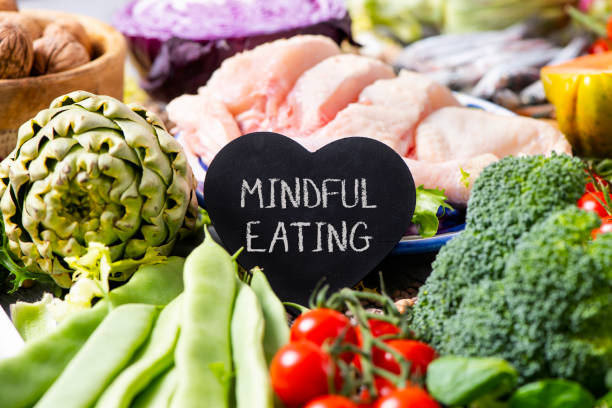In our fast-paced world, it’s easy to stuff food down our throats on the go. But what if there was a way to eat that not only nourished your body, but also increased your enjoyment of food, improved your digestion, and even helped you manage your weight? do you Eat mindfully – a powerful practice that can revolutionize your relationship with food.
Benefits of mindfull eating
Why is Mindful Eating Important?
Mindful eating is about paying attention to the present moment experience of eating. It involves tuning into your body’s internal signals of hunger and fullness, enjoying the taste, texture, and aroma of your food, and eating without distraction. This awareness creates a shift from autopilot eating to a more conscious and deliberate approach.
Here’s why mindful eating is important:
- Improved Awareness:Mindfulness helps you become more aware of your physical and emotional hunger cues. Are you reaching for food because your stomach is growing, or are you stressed and looking for emotional relief? Recognizing these triggers can help you make healthier choices.
- Reduce Overeating: When you eat mindfully, you slow down and pay attention to your body’s signals of fullness. This can prevent you from overeating and feeling uncomfortably full. Studies show that mindfulness of eating can lead to weight loss or weight management.
- Enhanced Enjoyment of Food: By slowing down and focusing on the sensory experience of eating, you can truly appreciate the taste, texture, and aroma of your food. This heightened awareness can lead to greater satisfaction and enjoyment of your food.
- Better Relationship with Food: Mindful eating promotes a more positive and non-judgmental relationship with eating. It helps you overcome the guilt and shame often associated with food and allows you to see food as nourishment for your body.
- Increased Satisfaction: Mindful eating promotes feelings of fullness and satiety that go beyond just the feeling of being physically full. It can prevent cravings and snacking between meals, leading to longer-lasting satisfaction.
- Emotional Regulation: Our emotions can significantly impact our eating habits. Mindful eating helps us identify emotional triggers for unhealthy eating and develop healthier coping mechanisms to deal with stress and anxiety.
- Reduced Stress: The act of mindful eating itself can be a powerful stress reliever. Focusing on the present-moment experience of eating gives us a break from everyday worries and promotes relaxation.
- Enhanced Nutrient Absorption: When we eat mindfully, we chew our food more thoroughly, which aids in digestion and allows our bodies to absorb nutrients more efficiently.
- Heightened Taste Perception: Slowing down and focusing on the taste of your food allows you to appreciate the full spectrum of flavors, making even simple meals more enjoyable.
- Mind-Body Connection: Mindful eating strengthens the mind-body connection. It helps us become more aware of how our bodies react to different foods and allows us to make conscious choices that support our overall well-being.
- Sustainable Eating Habits: Mindful eating isn’t a fad diet; it’s a sustainable lifestyle change. By developing mindful eating habits, you can create a healthier and more balanced relationship with food for the long term.
How Effective is Mindful Eating?
Research suggests that mindful eating practices can be quite effective in promoting positive changes in eating behaviors and overall health. Studies have shown that mindful eating can lead to:
- Weight loss or weight management
- Reduced emotional eating
- Improved digestion
- Lower stress levels
- Increased self-compassion around food choices
While mindful eating may not be a magic bullet for everyone, it provides a powerful tool for individuals looking to improve their relationship with food and promote overall health.
3 Mindful Eating Habits to Get You Started
Ready to give mindful eating a try? Here are three simple habits to incorporate into your daily routine:
- Practice Gratitude:Before taking your first bite, take a moment to appreciate the food on your plate. Consider the journey it took to get there – from the farmer who produced it. A simple thank you for the nourishment can enhance your enjoyment of food.
- Engage Your Senses: Remove distractions like your phone or TV. Pay attention to the appearance, aroma, texture and taste of your food. Chew each bite slowly and savor the different flavors.
- Tune into Your Body: Pay attention to your hunger and fullness cues. Eat slowly and stop when you feel comfortably satisfied, not full. If you feel your mind wandering, gently bring your attention back to the sensation of the food.
These are just a starting point. With practice, mindful eating can become a natural part of your daily routine, empowering you to make

